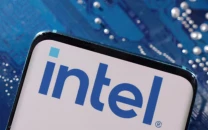US judge rejects Yahoo data breach settlement
The settlement called for a $50 million payout

A photo illustration shows a Yahoo logo on a smartphone in front of a displayed cyber code and keyboard on December 15, 2016.
PHOTO: REUTERS
In a Monday night decision, US District Judge Lucy Koh in San Jose, California, said she could not declare the settlement “fundamentally fair, adequate and reasonable” because it did not say how much victims could expect to recover.
Yahoo, now part of New York-based Verizon Communications, was accused of being too slow to disclose three breaches from 2013 to 2016 that affected an estimated 3 billion accounts.
Yahoo Japan to buy minority stake in cryptocurrency exchange
The settlement called for a $50 million payout, plus two years of free credit monitoring for about 200 million people in the United States and Israel with nearly 1 billion accounts.
But the judge said the accord did not disclose the size of the settlement fund or the costs of the credit monitoring, and the proposed class may be too big because the number of “active” users that Yahoo disclosed privately to her was far lower.
Koh also said the maximum $35 million of fees for the plaintiffs’ lawyers may be “unreasonably high,” saying the legal theories of the case were “not particularly novel.”
A lawyer for the plaintiffs did not immediately respond on Tuesday to requests for comment.
Verizon said: “While preliminary approval of the settlement was not granted, we’re confident that we can achieve a viable path forward.”
Yahoo revealed the full scope of the breaches after having agreed in July 2016 to sell its internet business to Verizon for $4.83 billion. The revelations prompted a cut in the purchase price to $4.48 billion.
US prosecutors charged two Russian intelligence agents and two hackers in connection with one of the breaches in 2017. One hacker later pleaded guilty.
Armstrong out at Verizon's Oath after integrating AOL, Yahoo
Koh contrasted her decision with her approval last August of health insurer Anthem’s $115 million settlement over data breaches affecting about 79 million victims.
The judge said Anthem, unlike Yahoo, timely disclosed the breaches, offered free credit monitoring even before settling and committed to upgrading its data security.
“Yahoo’s history of nondisclosure and lack of transparency related to the data breaches are egregious,” Koh wrote.
“Unfortunately, the settlement agreement, proposed notice, motion for preliminary approval, and public and sealed supplemental filings continue this pattern of lack of transparency,” she added.


















COMMENTS
Comments are moderated and generally will be posted if they are on-topic and not abusive.
For more information, please see our Comments FAQ